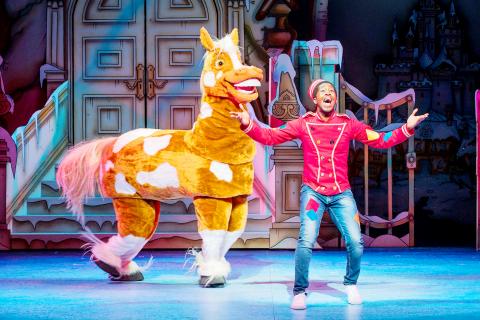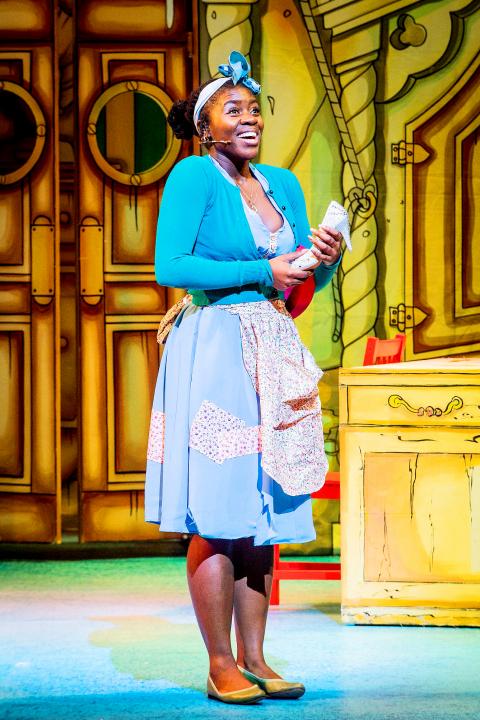A figure styled as Donald Trump is booed off stage by a rowdy audience enjoying the thrills of British pantomime, bringing a contemporary twist to traditional fairytales. Up and down the country over the festive season, children and adults alike flock to theaters to watch a “panto” — complete with princesses, political jibes and innuendo. Audiences attending pantomimes instinctively know when to yell out stock phrases such as “He’s behind you!”, while newcomers quickly learn when to join the collective hissing or cheering.
“Lots of Americans who come in are just wide-eyed and can’t believe it! And by the end they’ve got it, they’re joining in too,” said Susie McKenna, director and actor who plays the Wicked Stepmother in Cinderella at London’s Hackney Empire theater. “It is definitely unique, it is definitely quintessentially British.”
Pantomime traces its origins to the 16th-century “Commedia dell’Arte,” a form of Italian street theater which traveled to Britain, according to London’s Victoria and Albert Museum.

photo: AFP/hackney empire
It was transformed through London theaters, initially with music but no dialogue, morphing into the familiar Christmas panto during the Victorian era.
Pantomimes are now staged at theaters across Britain, often starring a local celebrity and actors of all ages.
BREXIT, TRUMP AND WEINSTEIN

photo: AFP/hackney empire
In Hackney, McKenna has been writing the annual festive show for nearly 20 years and has become accustomed to another tradition — weaving in references to recent events.
“This year because we were talking about the travesty that is Brexit, we have a character who’s Italian who’s going to be deported,” she lamented, reflecting the views of the largely pro-EU neighborhood.
Tax havens and fake news also get a mention, while the brief appearance of Trump at the royal ball — which Cinderella flees at midnight — speaks to the ongoing saga of the US president’s planned state visit to the UK.
“So many people have said to me it was such a release, to feel that they could boo him,” said McKenna, recalling audiences’ delight when Trump is banished from the ball.
For Darren Hart, who plays Cinderella’s best friend Buttons, contemporary audiences are open to a recap of news alongside their musical theater.
“That’s how fast society is now and how fast we are with our media,” he said.
“Referencing social culture but having our twist on it, and allowing the audience to debate it more afterwards.”
While pantomimes fill big theaters, new spaces are also tackling the genre with one London show this season being performed in a converted caravan.
“Caravantomime” takes on the fairy tale Sleeping Beauty, whose star joins forces with a lost Cinderella to change both their destinies.
“With a bit of sense of humor, we question what’s going on in certain fairy tales, and we absolutely bring in what’s been happening,” said Robin Steegman, creator of the 20-minute show she describes as an “anti-panto.”
Steegman gives her heroines the agency they lack in their original stories, while also making direct reference to disgraced Hollywood mogul Harvey Weinstein — who is facing multiple accusations of sexual misconduct, which he denies.
“Sexual harassment, I think, especially in this climate, it’s good to bring it to life that it happens in many situations,” she said.
BREAKING BARRIERS
But although Steegman has overhauled the fairy tale ending, her play has kept true to panto form with its wider cultural references and men in drag.
As well established as the pantomime horse — played by two actors inside a furry costume — the pantomime sees a male actor take on a lead female role. While men and boys have played female parts for centuries in Britain, largely due to societal restrictions placed on women, Hart believes that continuing to bend the gender norms can help children become more open-minded as they grow up.
“What it allows them to do is to break down those barriers that may form later on in life and the questions they may ask. Because a lot of children don’t question it,” he said.
But beyond the celebrated traditions on stage, the key to a successful panto is the audience.
“It’s different to normal theater, because normal theater is like watching a TV boxset but it’s live,” said Aisha Jawando, who plays Cinderella at Hackney Empire. “Panto is very inclusive. We want to hear people making noise,” she added.
Hart agreed, rolling off a list of pantomime essentials including a good script and a great dame.
“The last thing is an audience that is willing to have a good time. There’s no point coming to a panto expecting to just sit there and watch it, it’s a waste!”

May 18 to May 24 Pastor Yang Hsu’s (楊煦) congregation was shocked upon seeing the land he chose to build his orphanage. It was surrounded by mountains on three sides, and the only way to access it was to cross a river by foot. The soil was poor due to runoff, and large rocks strewn across the plot prevented much from growing. In addition, there was no running water or electricity. But it was all Yang could afford. He and his Indigenous Atayal wife Lin Feng-ying (林鳳英) had already been caring for 24 orphans in their home, and they were in

On May 2, Chinese Nationalist Party (KMT) Chairman Eric Chu (朱立倫), at a meeting in support of Taipei city councilors at party headquarters, compared President William Lai (賴清德) to Hitler. Chu claimed that unlike any other democracy worldwide in history, no other leader was rooting out opposing parties like Lai and the Democratic Progressive Party (DPP). That his statements are wildly inaccurate was not the point. It was a rallying cry, not a history lesson. This was intentional to provoke the international diplomatic community into a response, which was promptly provided. Both the German and Israeli offices issued statements on Facebook

President William Lai (賴清德) yesterday delivered an address marking the first anniversary of his presidency. In the speech, Lai affirmed Taiwan’s global role in technology, trade and security. He announced economic and national security initiatives, and emphasized democratic values and cross-party cooperation. The following is the full text of his speech: Yesterday, outside of Beida Elementary School in New Taipei City’s Sanxia District (三峽), there was a major traffic accident that, sadly, claimed several lives and resulted in multiple injuries. The Executive Yuan immediately formed a task force, and last night I personally visited the victims in hospital. Central government agencies and the

Australia’s ABC last week published a piece on the recall campaign. The article emphasized the divisions in Taiwanese society and blamed the recall for worsening them. It quotes a supporter of the Taiwan People’s Party (TPP) as saying “I’m 43 years old, born and raised here, and I’ve never seen the country this divided in my entire life.” Apparently, as an adult, she slept through the post-election violence in 2000 and 2004 by the Chinese Nationalist Party (KMT), the veiled coup threats by the military when Chen Shui-bian (陳水扁) became president, the 2006 Red Shirt protests against him ginned up by